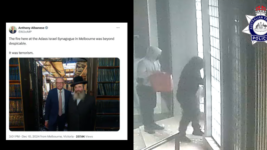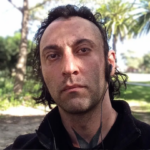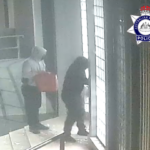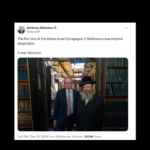Synagogue Arson Attack Arrest Hints at Sydney’s Antisemitic “Criminal Con Job”

A 20-year-old man was arrested on Boon Wurrung land in the Melbourne suburb of Williamstown on Wednesday, 16 July 2025, in relation to allegedly having stolen the VW Golf sedan used in the Adass Israel Synagogue of Melbourne arson attack last December, and just like the Sydney “antisemitic” crimewave, police are turning up low-level criminals being directed by unknown entities.
The synagogue attack took place at around 4 am on 6 December 2024 in the Melbourne suburb of Ripponlea. Captured on CCTV footage, three young men wearing hoods were seen to pull up in the VW, take an axe to the front entrance and then pour jerry cans of petrol into the building prior to setting it ablaze. The vehicle was used in multiple crimes, some unrelated on the same night.
The Adass Israel arson attack came at a particular fever pitch point in the local debate over this nation’s tacit support for Israel in its genocide against the Palestinians of Gaza, as it voted in favour of a UN resolution calling on Israel to exit the Palestinian territory just days earlier, while Greater Sydney had been subjected to a series of anti-Israel arson and graffiti attacks since late October 2024.
A source close to the Victorian Joint Counter Terrorism Team told the Herald this week that the JCCT officers are stumped as to who ordered the arson attack and why, as their inquiries have only led to minor suspects being identified, who have no political affiliations or ideological beliefs suggesting they were motivated by antisemitism.
The similarities between the reported outcomes of the Adass Israel Synagogue investigation and the snippets that were disseminated around inquiries into a series of so-called antisemitic incidents that occurred across Sydney last summer are stark, as they both involved unknown architects directing criminals-for-hire to commit acts to convey rising hatred towards Jewish people in the community.
A breakthrough to nowhere
Prime minister Anthony Albanese tweeted in the wake of the firebombing of Adass Israel that it was “beyond despicable” and “it was terrorism”. Victorian premier Jacinta Allan joined the PM in condemning it as an act of “antisemitism”, and while attacks on synagogues are undoubtably antisemitic in nature, as this state learnt last summer, the intent behind them can be otherwise.
The 20-year-old man from Williamstown that was taken into Victoria police custody on Wednesday has been charged over stealing what the authorities have called a “communal crime car”, which means a vehicle stolen by criminals to use in various crimes. The young man was also charged in relation to refusing to provide law enforcement with access to the apps on his mobile phone.
The introduction of the communal crime car scenario into the Adass Israel synagogue arson attack tends to cast doubt on the motivation behind it, as the VW Golf was also used in a shooting incident in the northeastern Melbourne suburb of Bundoora on the same night, and it was used in the commission of an arson attack on South Yarra’s Lux nightclub around the same time.
In May, Victoria police released footage capturing the synagogue arson attack that featured three hooded individuals. At that time, Victoria police assistant commissioner Tess Walsh told the press that “it’s possible the car was used by several different people and groups to commit these crimes”, and she added that while the use of communal crime cars is rare, it is not unknown.
According to Victoria’s acting premier Jaclyn Symes, however, the arrest of a 20-year-old who stole a car that was subsequently used in the commission of an incident being investigated as “terrorism” and “politically motivated” crime marks a “breakthrough” in the inquiry, which is now at a “critical point”, despite the fact that those directing the gig criminals remain concealed behind encryption.
“A fake terror plot”
In light of what transpired on Gadigal land in Sydney over the last summer, the slow-drip developments of the Adass Israel Synagogue investigation increasingly sound as if a similar scenario to that which played out in this city occurred in Naarm-Melbourne in relation to firebombing of the place of worship. Indeed, the recent synagogue attack in East Melbourne raises similar doubts.
The Australian federal police announced on 10 March 2024 that its investigations into the caravan filled with explosives found on Dharug land on a property in semirural Dural, and the entire spate of “antisemitic” crimes that had terrorised the Jewish community of Greater Sydney was staged by organised crime figures to make it look like the city was under siege of rising Jewish hate.
NSW police deputy commissioner David Hudson had been warning since the volatile caravan discovery became public knowledge on 29 January that the incident was potentially a “setup”. NSW police had 10 suspects in custody at that point in relation to the staged crimes spanning the course of about three months, and none of them had been motivated by ideology or Jewish hatred.
As the story unfolded, however, it became apparent that crime figures were paying poor gig criminals to perpetrate attacks to portray an antisemitic crimewave, so those orchestrating the scenario could then use information about it, like the knowledge of the Dural caravan, to hand over to police in exchange for reduced punishment in relation to crimes unrelated to the staged crimewave.
Yet, despite the serious doubts surrounding the criminal attacks aimed initially at “Israel” but shifting in messaging to “Jews” after some time, the Minns government passed three rights-eroding pieces of hate crime and antiprotest legislation in February, which a parliamentary inquiry is now investigating as to whether these laws were passed in the understanding they were spurred by a potential hoax.
In it for the money
In terms of the dubious so-called antisemitic crimewave of the past summer in Sydney, Adam Moule assured the NSW Supreme Court on Monday, 14 July, that he was in it for the money. Moule was in court in relation to an 11 January arson and graffiti attack on a synagogue in inner city Newtown, as well as for the part he played in supplying the paint used in a related graffiti attack in Queens Park.
In 34-year-old Moule’s case, the prosecution is not arguing that he was motivated by ideology or religious hatred, but rather he was following the instructions of a neighbour, who was further being directed by another unidentified individual. Moule further stressed to the court that the people along the stages in the chain leading to the commission of the crimes were kept distinctly separate.
So, the similarities between what was occurring in Sydney and the arson attack on Adass Israel in Melbourne continue to increase as the investigations progress, and the so-called antisemitic crimes of the last summer now appear to have been staged to create a moral panic around antisemitism amongst communities that in truth were not boiling over with hatred towards Jewish people at all.







